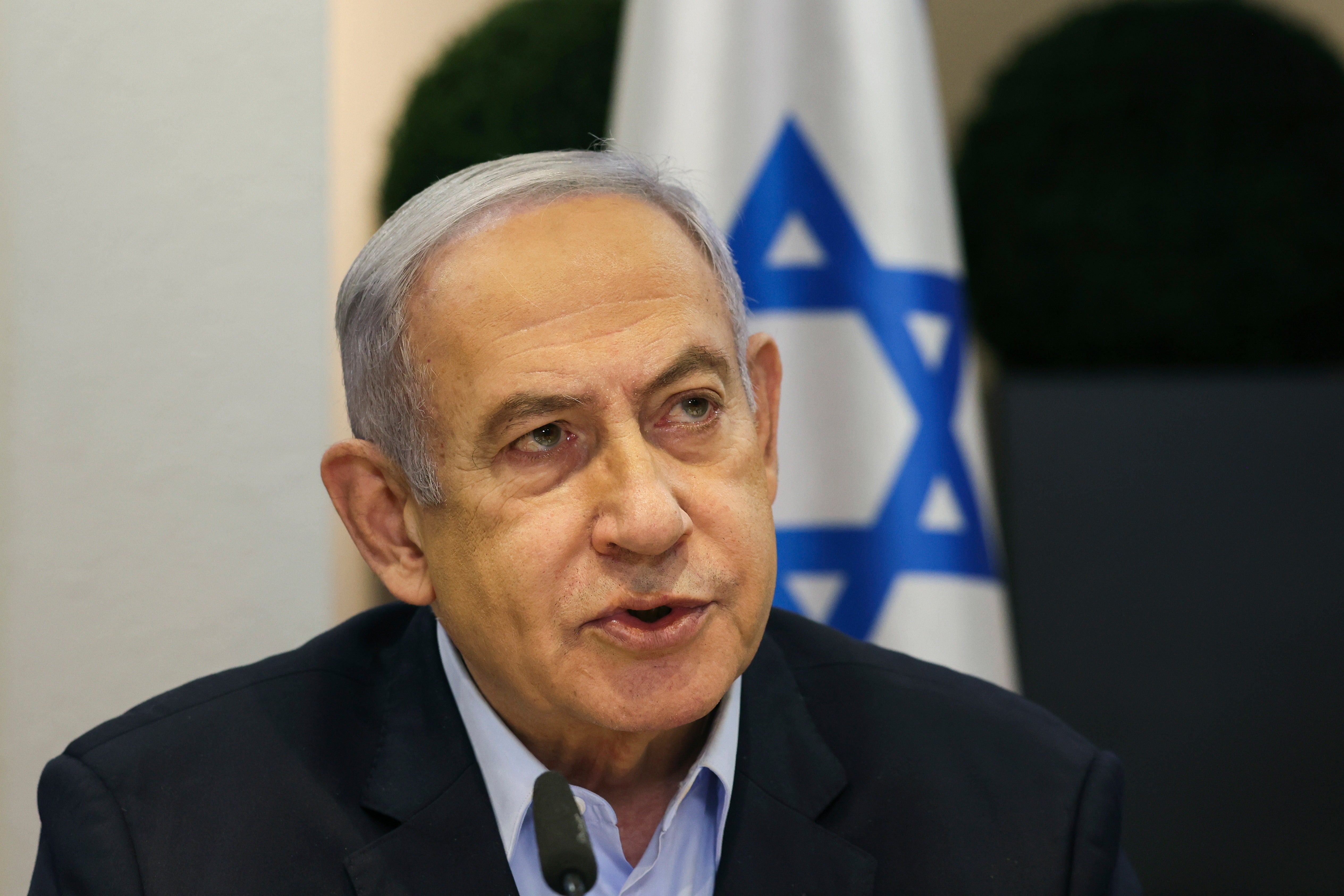Derided and deeply unpopular, Netanyahu has led his wounded nation down a bloody dead end
Editorial: The widespread demonstrations in Israel, where thousands are calling for the prime minister’s removal from office, show the true extent of the opposition to the way he has prosecuted this pitiless and counterproductive war in Gaza

On 7 October, when Hamas attacked southern Israel – killing some 1,200 people and taking 253 others hostage – virtually the whole world stood with Israel; and virtually all of Israel stood with the government of Benjamin Netanyahu. Mr Netanyahu even invited his main rival, Benny Gantz, to join a coalition war cabinet.
A nation united in grief was united in determination to defend itself against the worst antisemitic crime since the Second World War. And for a time, Mr Netanyahu – a divisive figure – enjoyed broad support to bring home the hostages and neutralise the terrorists.
No longer. The widespread demonstrations in Israel, where thousands are calling for Mr Netanyahu’s removal from office, show the true extent of the opposition to the way Mr Netanyahu has prosecuted this pitiless and counterproductive war in Gaza. Opinion polls in Israel reflect the despair that the protesters express about the conduct of the war. The prime minister himself is deeply unpopular.
Some 32,000 Palestinians been killed and 74,000 wounded – vast numbers of them women and children – according to the Gaza health ministry. In addition, the conflict has damaged regional stability and Israeli security and isolated the nation internationally.
What’s more (from the point of view of the protesters), the hostages remain imprisoned in Gaza, at risk of further bombing or being murdered by their captors. Many have already died – some shot by the very forces sent to save them. It is an intolerable situation, one that Mr Netanyahu does not seem to be able to resolve.
For all the horrifying starvation of Palestinian civilians, the children made orphans, the hospitals reduced to charred rubble, the destitution and the tens of thousands dead, Mr Netanyahu is losing this war. He has eliminated relatively few Hamas commanders – and created a fresh generation of aggrieved Palestinians in Gaza ready to carry on the cycle of violence.
Mr Netanyahu has also managed to alienate Israel’s staunchest allies and friends abroad. It is fair to say the agitation against the Israeli government across the West, let alone the Muslim world, is unprecedented. The recent shock defeats of President Erdogan’s party in the Turkish regional elections were partly due to dissatisfaction with his policy towards Israel.
When the president of the United States and the prime minister of Israel are on barely speaking terms, then it is time for the people of Israel to understand the true extent of the damage that Mr Netanyahu is inflicting on their nation. Too many Western leaders are openly discussing limiting aid to Israel for comfort.
Mr Netanyahu is shortly to undergo a general anaesthetic for a hernia operation: and yet, as if leaving a will to his successors should the worst befall him, he has committed his administration to the ground and aerial assault on Rafah. Always stubborn, Mr Netanyahu is pitting himself not just against Hamas but, once again, the innocent civilians of Gaza (whom he barely concedes deserve any human rights), Western public opinion and, now, even his own citizens.
Almost six months on from the murder, rape and kidnapping of peaceful festivalgoers and residents of kibbutzim last year, Hamas must be hardly able to believe how Mr Netanyahu has played into its hands. The Hamas leadership has no more interest in the welfare of the people of Gaza than does Mr Netanyahu – which is another Palestinian tragedy.
But Mr Netanyahu doesn’t seem to understand that essential truth, and the fact that it will not surrender to him no matter how many Palestinians die. Hamas is interested in creating instability and confusion in the hope that it will serve its interests.
It has, sadly, succeeded. It has new allies in Yemen, the Houthi guerrillas who have forced sea traffic to divert from the Suez Canal. Hamas has subverted all efforts to normalise diplomatic relations between Israel and its neighbours, from Morocco to the United Arab Emirates.
For now, the Abraham accords process is dead and Mr Netanyahu’s dream of a regional economic bloc has expired with it. America is rightly alarmed by the resurgence of Iranian influence and sponsored terrorist activity in the region, as well as its closer alliance with Russia.
Western allies are actively debating how to push Israel towards a ceasefire, which would be in its interests, even if they had to make concessions to Hamas about its permanence. Hamas doesn’t really want a ceasefire because it would stop a war that has served its geopolitical interests well – and once again, Mr Netanyahu makes it too easy for the militants to reject his terms.
America now refuses to use its veto at the UN automatically to protect an ally it feels is out of control. Israel, for the first time, has to answer a charge of genocide at the International Court of Justice. And now Israelis are turning against their own government. Only the fact that the conflict has not (yet) spread to the West Bank and Lebanon is saving Mr Netanyahu and his people from an even more dangerous conflagration.
Tactically, Mr Netanyahu has led his wounded nation down a bloody dead end. The deeper problem is that he has no vision for a framework for peaceful coexistence with the Palestinians. He rejects the two-state solution, yet he doesn’t want to occupy the territories indefinitely, even if that was a practical proposition.
There are no easy answers to the conflicts in the Middle East; however, Mr Netanyahu is unusual in not even evincing any interest in a solution. And that is why he should not be leading his country.






Join our commenting forum
Join thought-provoking conversations, follow other Independent readers and see their replies
Comments